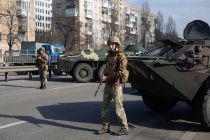Damaged Russian vehicles in Ukraine, in the city of Kharkiv.(Photo: Getty Images)
Geopolitical analysis.We thought this risk over in the West with the end of the Cold War, but the invasion of Ukraine by Russia has resurrected it.War is again part of the risks that Canadian companies must (re) learn to manage when active in Europe in order to continue to do business almost normally.
I write (re) learn this risk, because the Canadian multinationals had learned to manage it in Europe after the Second World War.From 1945 to 1989, the former Soviet Union occupied half of the European continent, and Westerners lived constantly in the fear that Russian tanks swept one day in Western Europe.
Older business people or history enthusiasts still remember this time, where political crises on the old continent were numerous:
This is not to mention the constant risk of a war between the troops of the Organization of the North Atlantic Treaty (NATO) and those of the Warsaw Pact, with the potential use of so -called tactical nuclear warheads on the groundEuropean, that is to say much less powerful than the Hiroshima bomb.
Or other international crises opposing American and Soviets who could have really turned badly, starting with the Missile crisis in Cuba (from October 14 to October 28, 1962), which almost caused a nuclear war.
Despite all these risks, Canadian companies have not really prevented themselves from doing business or investing in Western Europe between 1945 and 1989.They have rather learned to manage the risk of war and to continue their activities almost normally.
Well, we have to relearn how to do the same thing in the wake of the invasion of Ukraine.
For example, we will have to learn to manage the risk of invasion of a sovereign country by another sovereign country in Eastern Europe and Central Europe.
Also, if your business has for example the project to get their supplies or set up in Romania, Poland or in Baltic countries, well, it should not necessarily give it up despite the war in Ukraine.
Of course, zero risk does not exist in the current context.
As the rest of the zero risk did not exist during the Cold War, when a Canadian company supplied or established itself for example in Western Germany, not far from Soviet soldiers and those of the countries of the Pact ofWarsaw, massed behind the iron curtain.

In addition, the fact that Romania, Poland and the Baltic countries are members of NATO also reduces this risk, without however excluding it.Because an attack on Russia against one of these countries of the Atlantic Alliance would cause a replica from all other NATO countries.
And the Russian president, Vladimir Putin, knows it very well.
A Ukrainian soldier awaiting fighting.(Photo: Getty Images)
Nuclear risk is also back, and we will have to live with in the future.
That said, the use of a tactical nuclear warhead in Ukraine remains unlikely, even if NATO allies take this threat to this.
However, without minimizing it, this risk should not paralyze us.
This is the great lesson in the Cold War: nuclear powers are very reluctant to use these weapons, because the risk of climbing is too large and its fatal consequences for humanity and the environment.
This is the principle of assured mutual destruction or the balance of terror which precisely prevents using these weapons.Several specialists have written on this subject, including the American Kenneth N.Waltz (1924-2013), one of the greatest theorists in international relations.
He deals with this question in Reism and International Politics, a collection of tests published in 2008 on various issues, including the impact of nuclear weapons in international relations (Toward Nuclear Peace).
The war in Ukraine has brought Europe into a new era, which we still do not grasp the whole range.
Certainly, we will not be able to go back.We will have to live with a new geopolitical reality, where the collective security of Europe will be a priority for the years and the decades to come.
On the business level, Canadian businesses active in Europe will have to manage a risk of war, as many already do the rest when they are for example active in certain regions of Africa and the Middle East.
Because, despite everything, life (business) must continue to the extent, of course, where personnel security is not threatened directly in Europe.
Men and women did it during the Cold War on the old continent.
You can do it too today.








